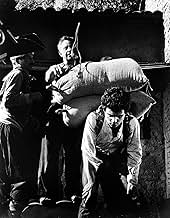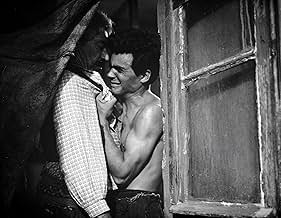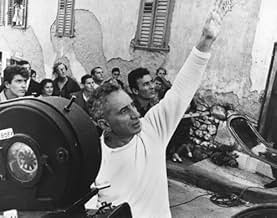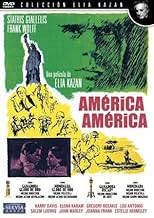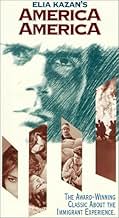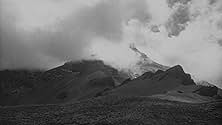AVALIAÇÃO DA IMDb
7,7/10
6,3 mil
SUA AVALIAÇÃO
Um jovem grego, encarregado da fortuna de sua família, perde-a caminho de Istambul, apesar disso, ele sonha com ir para os Estados Unidos.Um jovem grego, encarregado da fortuna de sua família, perde-a caminho de Istambul, apesar disso, ele sonha com ir para os Estados Unidos.Um jovem grego, encarregado da fortuna de sua família, perde-a caminho de Istambul, apesar disso, ele sonha com ir para os Estados Unidos.
- Direção
- Roteirista
- Artistas
- Ganhou 1 Oscar
- 7 vitórias e 12 indicações no total
Garrett Cassell
- Dog Walker
- (não creditado)
Tom Holland
- Voice Overs
- (narração)
- (não creditado)
Elia Kazan
- Self
- (narração)
- (não creditado)
Avaliações em destaque
Imagine a film like "The Godfather" receiving almost no audience, relegated to the occasional appearance on the AMC channel, barely being released on VHS or DVD, and you will have some idea of the tragic fate of this lost epic masterpiece. As hard as it is to believe, this may be the prolific director Elia Kazan's greatest film achievement, yet hardly anyone has seen it. This is a film on the epic scale of "The Godfather," about a young Armenian man's escape from Turkish persecution, flight from Anatolia, and eventual immigration to Ellis Island - all based upon the the experiences of the director's uncle. What is also tragic is the fact that I can think of no other film which portrays the cruel persecution and genocide inflicted upon the Armenian minority by the Ottoman Turks in the early 20th century (which Hitler correctly pointed to as proof that the world would look the other way at the genocide he had planned in Europe in the 1930s). Every period detail in the film is perfect, from the Oscar-winning costume design to the set design, Greek folk music score, veteran Haskell Wexler's cinematography, and acting - especially lead actor Giallelis, whose intensity brings to mind some of Brando's early work.
It is obvious that this film was a very personal piece of film-making for Kazan. And though I don't want to dwell as others do on Kazan's checkered past in his naming of communist colleagues for HUAC in the 1950s, it is interesting to note a parallel in the main character Stavros' personal anguish in making the choice to leave his wealthy wife and use her money to immigrate to the United States; both men made the conscious decision to drive a wedge between them and their past relationships. This is truly a film for all Americans to treasure, and if I had my way, I would make sure it was broadcast every 4th of July just as "It's a Wonderful Life" is broadcast every Christmas. As a nation of immigrants and descendants of immigrants, this is a film virtually every American can relate to. I can't figure out why it is so obscure.
It is obvious that this film was a very personal piece of film-making for Kazan. And though I don't want to dwell as others do on Kazan's checkered past in his naming of communist colleagues for HUAC in the 1950s, it is interesting to note a parallel in the main character Stavros' personal anguish in making the choice to leave his wealthy wife and use her money to immigrate to the United States; both men made the conscious decision to drive a wedge between them and their past relationships. This is truly a film for all Americans to treasure, and if I had my way, I would make sure it was broadcast every 4th of July just as "It's a Wonderful Life" is broadcast every Christmas. As a nation of immigrants and descendants of immigrants, this is a film virtually every American can relate to. I can't figure out why it is so obscure.
The picture talks about a Greek young from Anatoly ( Turkey ) named Stavros ( Stathis Giallelis ). He is sent by his father to Constantinopla for helping their family . Howewer Stavros only thinks on America . Across the journey he will suffer several misfortunes , risks and odds in his relationships to friends (Frank Wolff, John Marley, Lou Antonio) and enemies . Later on , Stavros will work in laborious employments to obtain a passage in a splendid ship for the promised land.
The movie is a magnificent adaptation based on the autobiographic novel of Greek-Turkish director Elia Kazan who being a child emigrated along with his family to United States . Since the initiating he describes memories , emotions and infancy images , besides narrates the persecution to Greeks and Armenians by Turkish that finished in genocide . Kazan reflects the particular characters , rural sets in realism way , folkloric customs , glimmer landscapes as well as interior homes . Kazan achieved a real emotion and sensibility by means of slow-moving scenes and close-ups of protagonists full of dialogs dealing with essential feeling as familiar love , friendship or happiness . These images contrast with the breathtaking outdoors of the mountains and countrysides where are developed the events . Magnificent cinematography in black and white by Haskel Wexler . Awesome and evocative musical score in oriental style by Manos Hadjidakis ( Topkapi ). The motion picture is very well directed by Elia Kazan ( On the waterfront ) . The release won Academy Award , an Oscar for production design and attained three nominations referred to Director and original screenplay , plus obtained a Golden Globe for Director and the biggest prize in Festival of San Sebastian . Rating : Above average and astounding movie. Well worth watching .
The movie is a magnificent adaptation based on the autobiographic novel of Greek-Turkish director Elia Kazan who being a child emigrated along with his family to United States . Since the initiating he describes memories , emotions and infancy images , besides narrates the persecution to Greeks and Armenians by Turkish that finished in genocide . Kazan reflects the particular characters , rural sets in realism way , folkloric customs , glimmer landscapes as well as interior homes . Kazan achieved a real emotion and sensibility by means of slow-moving scenes and close-ups of protagonists full of dialogs dealing with essential feeling as familiar love , friendship or happiness . These images contrast with the breathtaking outdoors of the mountains and countrysides where are developed the events . Magnificent cinematography in black and white by Haskel Wexler . Awesome and evocative musical score in oriental style by Manos Hadjidakis ( Topkapi ). The motion picture is very well directed by Elia Kazan ( On the waterfront ) . The release won Academy Award , an Oscar for production design and attained three nominations referred to Director and original screenplay , plus obtained a Golden Globe for Director and the biggest prize in Festival of San Sebastian . Rating : Above average and astounding movie. Well worth watching .
Kazan's reputation seems to have been diminishing for some time, a process, ironically, that his 'Lifetime Achievement' Oscar seems to have accelerated. Yeah, he did betray his fellows and himself in the 1950s. Again, ironically, it's the films he made later in his career, which show the scars of his loss of self-esteem, which are the most fascinating - WILD RIVER, SPLENDOR IN THE GRASS, THE ARRANGEMENT - and most powerful of them all, AMERICA AMERICA.
I too am surprised that this monument to Americanism and monument of American cinema, seems not very widely known in America itself. It has all the values of classic American cinema - a strong, simple narrative, a limpid visual style which eschews any directorial histrionics to concentrate purely on the characters. It is the story of young men driven from their homeland and making the long voyage to America - the huddled masses yearning to be free. The journey is long and terribly hard, and even as the shore of American comes into view, sacrifices still have to be made. The end of the film is enormously powerful, one of the most moving I have ever seen - the effect is still with me now, 30 years after seeing it.
It is the story of Kazan's father and uncle - the character who makes an appearance, played by Richard Boone, in Kazan's more heavily fictionalised subsequent film THE ARRANGEMENT. It is a personal story, and the simplicity of the telling seems like the end of a process of endless re-telling around smokey fireplaces, and before children go to sleep, a family saga which has almost attained the status of myth. The savagery of the film's first hour, and the dream-like quality of the last act make AMERICA AMERICA a genuine and powerful part of American mythology.
So don't torture yourself about whether Kazan was morally and politically wrong in betraying his colleagues - see AMERICA AMERICA, and you'll see why he could never have acted any differently. Yes, he was a radical, and a leftist, and a deeply intelligent and passionate man; but he was also an immigrant - and his horror of disenfranchisement and ejection overcame his moral and political views. Kazan may criticise aspects of its culture and politics, but he loves and respects and is grateful to America above all. So he made his choice. He could have made no other.
I too am surprised that this monument to Americanism and monument of American cinema, seems not very widely known in America itself. It has all the values of classic American cinema - a strong, simple narrative, a limpid visual style which eschews any directorial histrionics to concentrate purely on the characters. It is the story of young men driven from their homeland and making the long voyage to America - the huddled masses yearning to be free. The journey is long and terribly hard, and even as the shore of American comes into view, sacrifices still have to be made. The end of the film is enormously powerful, one of the most moving I have ever seen - the effect is still with me now, 30 years after seeing it.
It is the story of Kazan's father and uncle - the character who makes an appearance, played by Richard Boone, in Kazan's more heavily fictionalised subsequent film THE ARRANGEMENT. It is a personal story, and the simplicity of the telling seems like the end of a process of endless re-telling around smokey fireplaces, and before children go to sleep, a family saga which has almost attained the status of myth. The savagery of the film's first hour, and the dream-like quality of the last act make AMERICA AMERICA a genuine and powerful part of American mythology.
So don't torture yourself about whether Kazan was morally and politically wrong in betraying his colleagues - see AMERICA AMERICA, and you'll see why he could never have acted any differently. Yes, he was a radical, and a leftist, and a deeply intelligent and passionate man; but he was also an immigrant - and his horror of disenfranchisement and ejection overcame his moral and political views. Kazan may criticise aspects of its culture and politics, but he loves and respects and is grateful to America above all. So he made his choice. He could have made no other.
I first saw America, America when it was originally released and I saw it with my father. When the lights came up, I looked at my father and there were tears in his eyes and he said "this is my story too". His journey to America was the same as the character in the movie, only he came from Armenia.
Elia Kazan, with this movie has told the story of many immigrants, just like my father, with truth and depth of character. This isn't a fairy tale, the story is real and reflects the perils and experiences many immigrants took to come to
America. I am amazed that more people don't know about this movie. Whenever I rewatch it, I am reminded of the sacrifices my father made to come to this country and why I'm am blessed to be an American.
Elia Kazan, with this movie has told the story of many immigrants, just like my father, with truth and depth of character. This isn't a fairy tale, the story is real and reflects the perils and experiences many immigrants took to come to
America. I am amazed that more people don't know about this movie. Whenever I rewatch it, I am reminded of the sacrifices my father made to come to this country and why I'm am blessed to be an American.
This is a superb piece of filmmaking which has, unfortunately, been all but forgotten. The only weakness is in its star (Stathis Gialellis), but the film is so good that it doesn't matter (and, on second viewing, he's really not all that bad). I have seen this film many, many times on video and once I was privilaged to see it on on the "big Screen" at the Los Angeles County Museum of Art. I highly recommend it. The black and white cinematography by Haskell Wexler is top-notch. This film is a testament to the human spirit.
Você sabia?
- CuriosidadesOf all the films he had directed, this one was Elia Kazan's favorite film, as it was very personal to him.
- Erros de gravaçãoAn old woman is humming a tune from Astor Piazzolla's Libertango in the 1900s, decades before the composer was even born.
- Citações
Elia Kazan: [Voice- over] My name is Elia Kazan. I am a Greek by blood, a Turk by birth and an American because my uncle made a journey.
- Cenas durante ou pós-créditosDirector Elia Kazan narrates the main portion of the closing credits, reading the words as they appear on the screen, using complete sentences such as "The cinematography was by Haskell Wexler."
- ConexõesEdited into Grand format: Amérique, notre histoire (2006)
- Trilhas sonorasExcitement In The Village
Principais escolhas
Faça login para avaliar e ver a lista de recomendações personalizadas
- How long is America America?Fornecido pela Alexa
Detalhes
- Tempo de duração2 horas 54 minutos
- Cor
- Proporção
- 1.85 : 1
Contribua para esta página
Sugerir uma alteração ou adicionar conteúdo ausente







